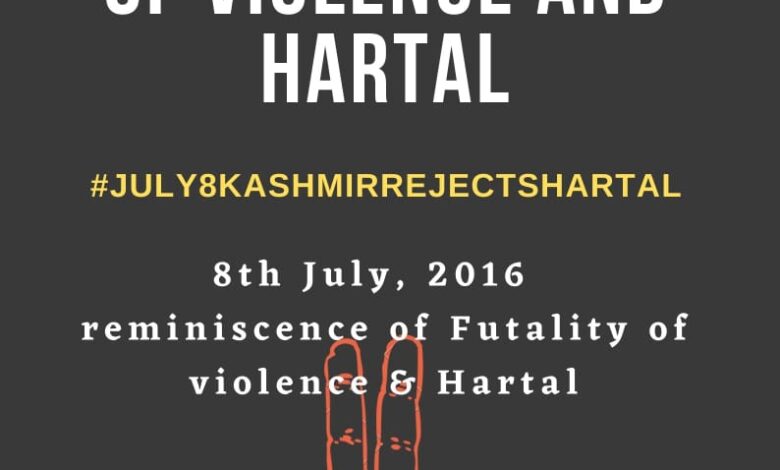J&K: Development Schemes like the ‘UMEED’ Run Counter to the Misleading Calls of the Kashmir Hartal on July 8, 13
The ‘UMEED’ scheme has given a new lease of life to rural women in Jammu and Kashmir especially amid the Covid-19 pandemic, after the long-standing i𝗻𝗷𝘂𝘀𝘁𝗶𝗰𝗲 which was 𝘀𝗲𝗿𝘃𝗲𝗱 𝘂𝗻𝗱𝗲𝗿 𝗔𝗿𝘁𝗶𝗰𝗹𝗲 370 𝗮𝗻𝗱 35-𝗔 𝘂𝗻𝗱𝗲𝗿 𝘁𝗵𝗲 𝗴𝗮𝗿𝗯 𝗼𝗳 𝗖𝗼𝗻𝘀𝘁𝗶𝘁𝘂𝗶𝗼𝗻𝗮𝗹 𝘀𝗮𝗳𝗲𝗴𝘂𝗮𝗿𝗱.

WordForPeace.com Special
 The ‘UMEED’ scheme has given a new lease of life to rural women in Jammu and Kashmir especially amid the Covid-19 pandemic, after the long-standing i𝗻𝗷𝘂𝘀𝘁𝗶𝗰𝗲 which was 𝘀𝗲𝗿𝘃𝗲𝗱 𝘂𝗻𝗱𝗲𝗿 𝗔𝗿𝘁𝗶𝗰𝗹𝗲 370 𝗮𝗻𝗱 35-𝗔 𝘂𝗻𝗱𝗲𝗿 𝘁𝗵𝗲 𝗴𝗮𝗿𝗯 𝗼𝗳 𝗖𝗼𝗻𝘀𝘁𝗶𝘁𝘂𝗶𝗼𝗻𝗮𝗹 𝘀𝗮𝗳𝗲𝗴𝘂𝗮𝗿𝗱.
The ‘UMEED’ scheme has given a new lease of life to rural women in Jammu and Kashmir especially amid the Covid-19 pandemic, after the long-standing i𝗻𝗷𝘂𝘀𝘁𝗶𝗰𝗲 which was 𝘀𝗲𝗿𝘃𝗲𝗱 𝘂𝗻𝗱𝗲𝗿 𝗔𝗿𝘁𝗶𝗰𝗹𝗲 370 𝗮𝗻𝗱 35-𝗔 𝘂𝗻𝗱𝗲𝗿 𝘁𝗵𝗲 𝗴𝗮𝗿𝗯 𝗼𝗳 𝗖𝗼𝗻𝘀𝘁𝗶𝘁𝘂𝗶𝗼𝗻𝗮𝗹 𝘀𝗮𝗳𝗲𝗴𝘂𝗮𝗿𝗱.
Amid the misleading calls for the so-called KASHMIR HARTAL on July 8 and 13, there are no buyers for this diatribe. Those who have been attempting to push children, youth and women in Kashmir to the dark quagmire of unending conflict, are seriously threatening the development in the valley. But people in Kashmir reject their agenda to keep the valley unstable. They come to realise the fact that cross-border terrorism and unmeaningful agitations like the Kashmir Hartals on July 8 or 13 have led to loss of development, employment, peace and progress. Now their heroes are the freedom fighters like Maulana Abul Kalam Azad or Muslim scientists such as APJ Abdul Kalam, not the perpetrators of terror like Burhan Wani or Zakir Moosa.
One of the recent developments in Jammu and Kashmir is the ‘UMEED’ scheme which helps create first-ever women’s dairy. UMEED through its Self-Help Group platform has initiated a first of its kind all-women dairy Farmers Producer Organization at Mitrigam in Pulwama district which is aimed at achieving the financial independence for women.
Similarly, in Udhampur in Jammu and Kashmir, the Umeed scheme, a government-funded flagship project to empower women was launched. It aimed at empowering Kashmiri women and women from other parts of India. The Umeed programme under the Jammu Kashmir State Rural Livelihood Mission (JKSRLM) is a Centre-sponsored scheme to encourage women to be self-dependent and self-sufficient.
This is a great milestone being achieved in the path of women’s empowerment in Jammu & Kashmir after the revocation of Articles 370 and 35A. The two provisions of Articles 370 and 35A had actually violated the principles of Gender Equality. Section 6 of the Constitution of J&K, which derived its power from Article 35A, discriminated against women residents of the state who married a person from another state. The children from such marriage unions were not eligible to acquire several fundamental rights such as the right to acquire immovable property and a government job. Due to this discrimination, their children were not eligible for the PRC, which meant that they could not get admission to professional colleges and were not eligible to apply for state government jobs. They also could not inherit their mothers’ property or buy properties by themselves. Such a situation was particularly traumatic and painful for women who used to marry men from among the ‘outsiders’ and especially those who later got windowed or divorced. They faced added trauma as their children had no future in the state of J&K.
When the Constitution of India came into force on January 26, 1950, special provisions were made for the state of J&K in the form of Article 370 of the Constitution of India, which was actually a temporary provision and it remained so till date. Thus, the Article 35-A was also a provision incorporated in the Constitution of India giving the Jammu & Kashmir legislature a carte blanche to decide who all were “permanent residents ” of the state and confer on them special rights and privileges in public sector jobs, acquisition of property in the state, educational scholarships and other public aid and welfare. The provision mandated that no act of the legislature coming under it could be challenged for violating the Constitution or any other law of the land. Article 35-A was an article that was used to empower the J&K state’s Legislature to define “permanent residents ” of the state and provide special rights and privileges to those permanent residents. It was added to the Constitution of India through a presidential order i.e. the constitution (Application to Jammu & Kashmir) order, 1954 issued by the president of India on May 14, 1954, “in exercise of the power conferred by ” clause (1) of Article 370 of the Constitution of India, with the concurrence of the government of the state of Jammu & Kashmir. This special status granted to the state of Jammu & Kashmir was believed to be the prime inhibiting factor in the complete integration of the state with the union.




